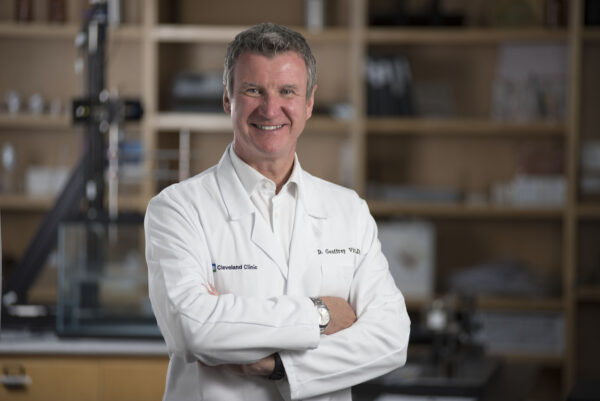

An engineer by training, Dr. Geoff Vince plans to leverage his process-driven traits in his new role as executive director of Cleveland Clinic Innovations, the health system’s commercialization arm.
Named to the role at the end of May, following a decade as chair of the biomedical engineering department, Vince is now charged with aligning Cleveland Clinic’s technology development strategies with scientific and research priorities. Founded in 2000, Cleveland Clinic Innovations has helped launch more than 80 startups.
In a phone interview with MedCity News, Vince discussed his plans for Cleveland Clinic Innovations, including the new product development model being implemented and the technologies he thinks will drive the greatest industry interest in the years to come.
Note: Responses were edited for length and clarity.
MedCity News: What are your key priorities as the new head of Cleveland Clinic Innovations?
Dr. Geoff Vince: I’m an engineer by training and whenever I go into a new venture, I always start by doing the same approach, no matter what it is. I find the baseline: where are we now? And I find the strategy: where do we want to go? And then I define the technology: how are we going to get there?
The model that we have right now, and that is in use at most innovation centers, is not really scalable to the extent that we want it to be.
So, the traditional [model for] innovation involves one person, who is called the innovation manager, going out and mining for ideas across the hospital or the university. And then they take those ideas, and they do assessments of markets and IP and technology. And if [the ideas] are deemed worthy, they then go into a technology development phase, which the innovation manager will lead. And then they’ll start looking for licenses or talking to the venture spin-out group — to sort of sell the ideas to the market.
And the problem with that model is you have one person who has to do everything. And I don’t know anyone who can do everything.
So, the model we’ve [been] implementing is more of a product development model. We will have members of the innovations group whose only role is to mine ideas and to interface with inventors. If they find inventions that they deem worthy, they will then pass them to a separate group — the assessment group — which will do the market analysis and the IP and the technology. Then there will be a committee that will make a decision on whether to move it forward or not. If it is [found to be] worthy, then we move it to a tech development group, which will be comprised of engineers and scientists with a background in product development and quality management systems.
The final phase lies with the sales and partnering group. [They’ll] be looking outward from the clinic to see what technologies we can bring to the market through sales…[and they’ll] be looking at where venture capital is putting their money and what is important in the market right now. [Then they will] bring that data back to the Clinic so that we can align with where the industry is moving.
Our intention is to use this model to grow the products that we can bring to the market. I think, preferentially, we’re going to grow therapies and diagnostics and health information technology.
MedCity News: You have spent the last 10 years as chair of the biomedical engineering department in the Lerner Research Institute. So, I’m curious, how do you think that experience will play into your new role at Cleveland Clinic Innovations?
Dr. Geoff Vince: Oh, I think it influences everything. Not just at work, but in life. I think engineers are born, not made.
As an engineer, I take a very process-driven approach and I’m very — and I think most engineers are — very cognizant of timelines and deliverables. And I think as we grow the group, those metrics are going to become more and more important to keep the projects on track.
MedCity News: I want to step back a little now. A few years ago there was a great deal of controversy surrounding Gary Fingerhut, the previous head of Cleveland Clinic Innovations who went to prison for defrauding the health system. How does that affect the group today and what are you planning to do to revamp its image?
Dr. Geoff Vince: The rearview mirror is smaller than the windshield for a reason. I always look forward. I think you always need to pay attention to what happens in any situation. You need to learn from the past, but my focus is on the future.
MedCity News: What are the types of healthcare technologies that will drive interest in the next, say, two to five years?
Dr. Geoff Vince: If you look at the strategic direction of the Cleveland Clinic right now — along with our research and innovations group — I think the area that we are investing in the most is health information technology, [for example] our alliance with IBM and the quantum computer.
But again, strategically, we are focusing on therapeutics and diagnostics, as we think that is where we’ll have the greatest area of growth.
MedCity News: How has the Covid-19 pandemic affected healthcare innovation?
Dr. Geoff Vince: I don’t think it influenced what we do at the Cleveland Clinic because we’ve always been innovative. I think what Covid did is it gave us a direction. There was obviously an immediate need, and we were — and still are — working on some very innovative ideas around Covid.
But I think those places that are going to innovate are going to innovate irrespective of what the situation is. They’re just going to focus efforts on an area where there’s an immediate need.
Photo: Cleveland Clinic


